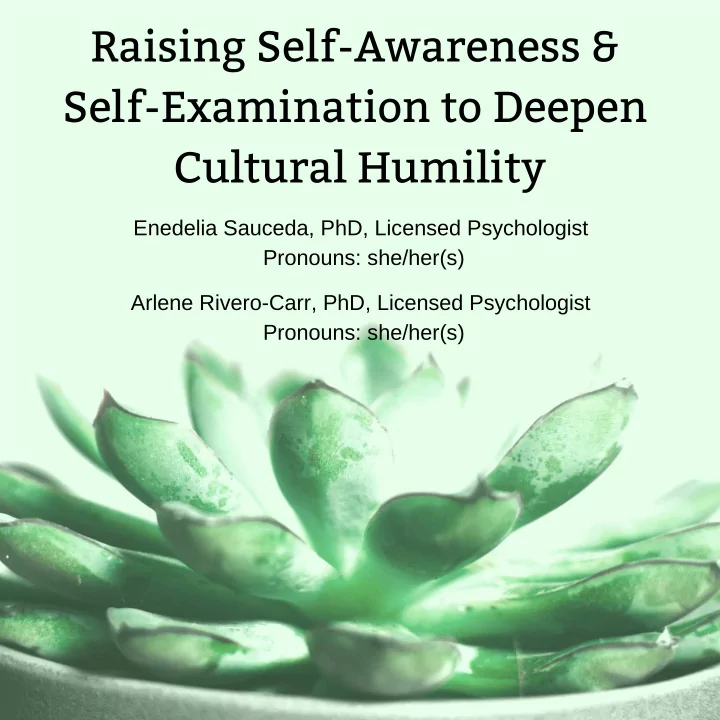

Raising Self-Awareness & Self-Examination to Deepen Cultural Humility Enedelia Sauceda, PhD, Licensed Psychologist Pronouns: she/her(s) Arlene Rivero-Carr, PhD, Licensed Psychologist Pronouns: she/her(s)
Assumptions We all benefit from and are hurt by systemic oppression. All oppression is connected . AORTA: Anti-Oppression Resource and Training Alliance
TERMS PRIVILEGE A special advantage or right that a person is born into or acquires during their lifetime. Often unaware of it and goes unexamined. Privilege implies power. INTERSECTIONALITY Describes the ways in which systemic oppressions (racism, sexism, homophobia, transphobia, ableism, xenophobia, classism, etc.) are interconnected and cannot be examined separately from one another. BIAS A prejudice in favor of or against one thing, person, or group compared with another, usually in a way considered to be unfair.
ALLY A member of a privileged group who examines their privilege and bias; supports and affirms others; seeks understanding and social change against oppressive symptoms. A committed practice based on trust, accountability and consistency. ACCOMPLICE Dismantles, disrupts, challenges oppressive systems. Works with the stakeholders in the oppressed group. They understand that their liberation is tied to others’…They drive the getaway car.
CULTURAL HUMILITY 1) Lifelong learning and critical self-reflection —we are complex beings with rich histories, experiences, and are contextual 2) Recognize & Challenge Power Imbalances— in our relationships/dynamics 3) Institutional accountability It is a philosophy—nothing to master It is (compassionate) listening over knowing M. Tervalon, J. Murray-Garcia (1998)
Self-Compassion Mindfulness & Affirmation Exercise Brene Brown & Kristin Neff
Identify Power Identities & Discussion What’s an identity that the most holds power/privilege: What do you LIKE about it? What do you DISLIKE about it? What’s an identity with less power/privilege: What do you LIKE about it? What do you DISLIKE about it?
Connection What’s an identity that the most holds power/privilege: How does it help you connect with others? How does it contribute to disconnection? ...an identity that holds the least holds power/privilege connection? disconnection?
Compassion Reminder Listen with the assumption that we are trying our best. We are here to grow/change. It takes courage to say or write these thoughts. We will lean into understanding and compassion. Acknowledge your reactions (i.e. muscle tension, bias, hurt, anger...)
GROWTH Identify an area of growth with a particular group, identity or concept (i.e. men, sizeism, LGBTQ+ population...) Identify why this is an area you want to work on. (i.e. "I notice that I avoid working with this type of client"..."I've been hurt by folks with this identity"...I want to be better for my son.") What has been the barrier to growth? (i.e. bias? shame? lack of access to knowledge?)
GROWTH Where did you get messages about this group? (i.e. my dad, media...) Label the terms of oppression (i.e. transphobia, sexism, racism...) How you benefit from these messages? (i.e. "I keep my privileges"..."the world accommodates me") How do these messages hurt you? (i.e. "I don't have a good relationship with my dad"... "My views hurts those I love"...)
Goals and Plan of Action to Bridge the Gap Think of how you've worked on other gaps How can you start? What resources do you need?
Resources AORTA: Anti-Oppression Resource and Training Alliance Lee Mun Wah Kathy O'Bear M. Tervalon, J. Murray-Garcia (1998). Cultural humility versus cultural competence: a critical distinction in defining physician training outcomes in multicultural education, Journal of health care for the poor and underserved, Vol. 9, No. 2. (May 1998), pp. 117-125.
Recommend
More recommend